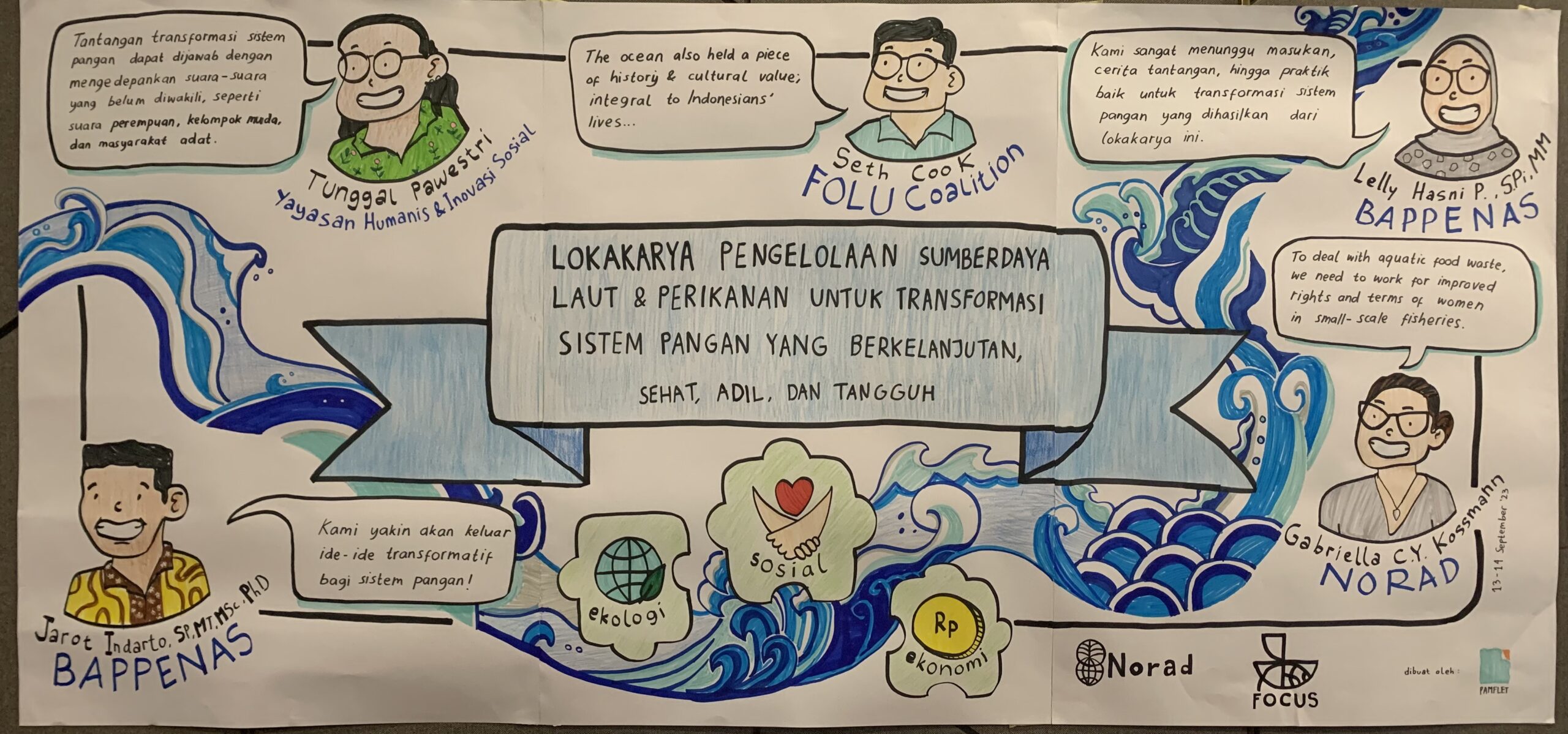
Climate Justice | October 5, 2023
From Ocean to Table: Transforming Indonesia’s Aquatic Food System for a more Equal, Sustainable, and Prosper future
Humanis Foundation
On 13-14 September 2023, Yayasan Humanis dan Inovasi Sosial as a member of FOLU Coalition Indonesia, alongside WRI Indonesia, CIFOR-ICRAF and with a tremendous support from Norwegian Agency for Cooperation Development (NORAD) held a joint-workshop titled “Workshop on Aquatic, Marine, and Fisheries Management to Achieve Healthy, Equitable, and Resilient Food System Transformation in Indonesia”, facilitated by Mulia Nurhasan, Ray Chandra Purnama, and Eva Anggraeni, this workshop strives to provide an understanding of the food system approach in the development and management of the aquatic, fisheries and marine sector in Indonesia, as well as capture inputs, strategies and innovations that can be applied to support food system transformation as one of the inputs to the draft RPJPN 2025 – 2045.
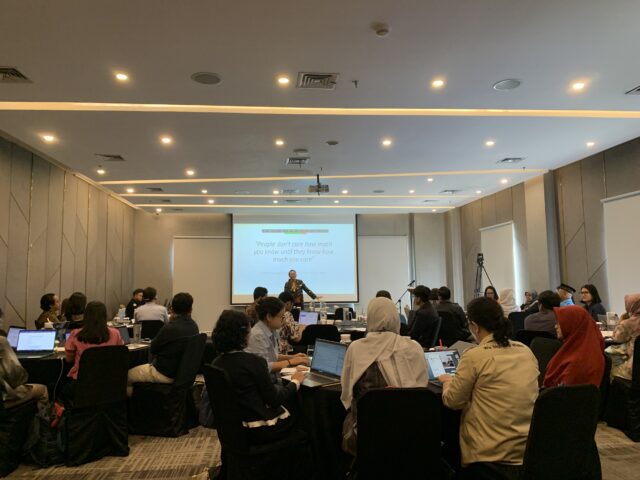
In particular, the workshop aims to:
- Improve the understanding of fisheries and marine sector stakeholders regarding the food systems approach, including the history and development of its application by the global community, also the position of the fisheries and marine sector in the world food system
- Explore and discuss issues related to food systems in the fisheries and marine sector from the perspective of environment, economic, socio-cultural and welfare/quality, and learn from the practices that have been implemented by various stakeholders to maintain the sustainability of the food system and ecosystem
- Develop shared vision for fisheries and marine sector development in Indonesia using the food system approach, describe the current conditions, identify challenges in achieving the agreed goals, and formulate strategies and activities needed to overcome the challenges.
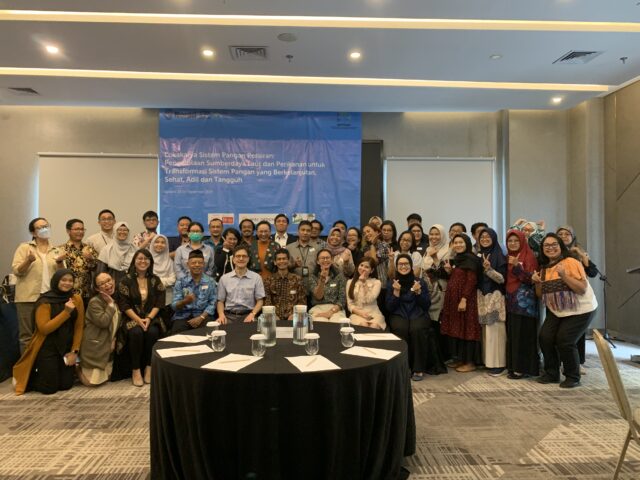
On 13 September 2023 Jarot Indarto, (Director of Food and Agriculture, Ministry of National Development Planning/Bappenas), officially inaugurated this event. Jarot stressed the importance of incorporating discourse related to fish and marine resources into this ongoing transformation, which had been in progress since 2019. In this workshop, we will explore the significance of this initiative and its alignment with Indonesia’s long-term development goals, as well as the challenges faced by the marine sector.
Jarot Indarto emphasized that the efforts to revamp Indonesia’s food system must incorporate the abundant marine resources that surround the nation’s archipelago. This perspective aligns with Bappenas’ vision, as outlined in the Blue Assessment, which encompasses the Blue Food System Transformation that currently in progress. Moreover, this initiative is integrated into Indonesia Long-Term Development Planning 2025 to 2045, demonstrating a long-term commitment to the sustainable utilization of marine resources.
Erwin Dwiyana, the Director of Marketing at the Directorate General of Strengthening the Competitiveness of Marine and Fishery Products of the Ministry of Maritime Affairs and Fisheries of the Republic of Indonesia, further underlined the importance of food security. He noted that this crucial issue had been discussed and agreed upon in the ASEAN Summit Declaration on September 5, 2023. This declaration reinforces the significance of addressing food security concerns in the region. While Indonesia’s fisheries sector has experienced substantial growth, as evidenced by a notable increase in gross production, it continues to confront multifaceted challenges. Destructive fishing practices and the adverse effects of climate change pose significant threats to the sustainability of marine resources. Additionally, the limited and uneven development of critical infrastructure, such as cold storage facilities, has hindered the progress of fisherfolk and various fisheries stakeholders, including industries and businesses.
Tunggal Pawestri, the Executive Director of Yayasan Humanis dan Inovasi Sosial, and Seth Cook, the Country Platform Coordinator for Asia-Pacific at the FOLU Global Secretariat, have delivered essential insights in their speeches about Indonesia’s ongoing food system transformation. They emphasized the need for a gender-sensitive and inclusive approach, amplifying the voices of underrepresented groups, and addressing unsustainable practices and the climate crisis in the country’s marine and fisheries sector.
Tunggal Pawestri and Seth Cook both emphasized the importance of making the food system transformation in Indonesia gender-sensitive and inclusive which means not only recognizing the role of women but also prioritizing the voices of other marginalized communities. These include youth, indigenous populations, persons with disabilities, and elderly groups, all of whom have been historically underrepresented in decision-making processes related to the food and marine sectors. Inclusivity ensures that the transformation benefits all segments of society and promotes social equity.
Seth Cook brings to light the pressing issues facing Indonesia’s marine and fisheries sector. Unsustainable practices and the looming climate crisis have pushed the country’s oceans into troubled waters. Several challenges are of immediate concern:
- Overexploitation of Fish Resources: Indonesia faces the grim reality of fully exploited fish resources and some species on the brink of overfishing. Urgent measures are needed to restore balance and protect these valuable resources for future generations
- Dependency on Small-Scale Fisheries: Small-scale fisheries form the backbone of Indonesia’s fish production, contributing at least 90 percent of the total. However, these crucial stakeholders are struggling due to criminalization and soaring operational costs. Supporting them is vital for the sustainability of the fisheries sector and the livelihoods it sustains.
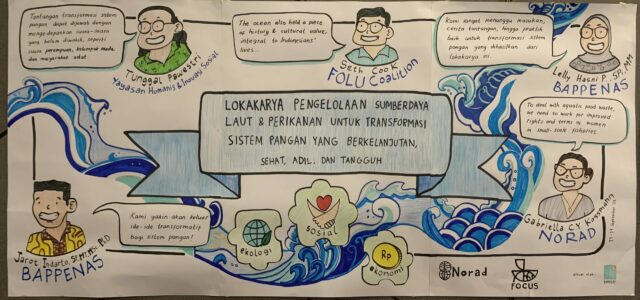
In addition to Jarot, Erwin, Tunggal, and Seth who had opened the workshop on the first day, the workshop also featured two keynote speakers who joined remotely, they are, Pip Cohen from Australia and John Ingram from the United Kingdom. Both of those distinguished experts were talked about “Fish in Food Systems: Beyond Production and Protein” and the “Unpacking Food System Concepts to Transform Food System Outcomes”.
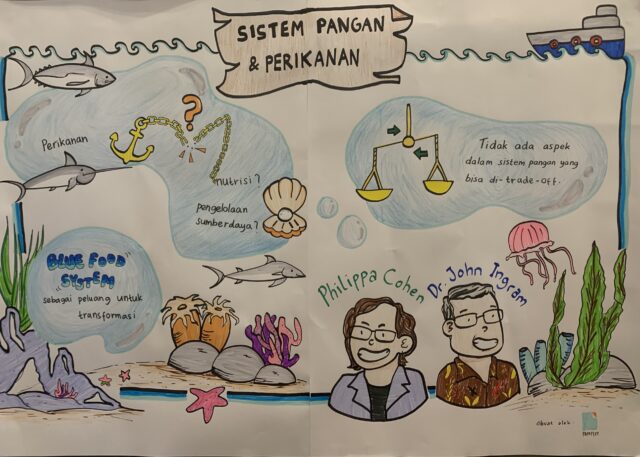
Still on the first day of the workshop, all 35 participants, comprising 20 women and 15 men from various stakeholder groups, were divided into four working groups. Each group used the “Rich Picture” method to discuss four fundamental components of Indonesia’s current food system.
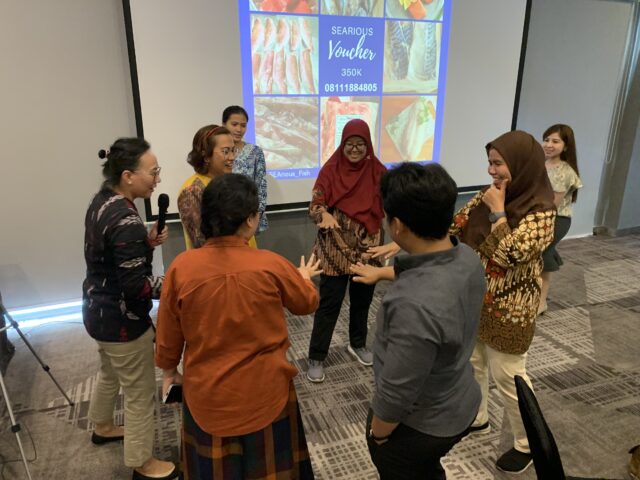
The groups were focused on the following sectors:
1. Coastal Fisheries Group:
Goal: Healthy coastal ecosystems and sovereign and prosperous coastal communities.
Key Elements:
- Regulation
- Sustainable practices
- Inclusive and equitable food system transformation
- Recognition of fisherwomen’s professional identity
2. Large-Scale Commercial Fishing Group:
Goal: Produce quality food to improve nutrition, economic, social, and sustainability.
Key Elements:
- High-quality food production
- Nutrition improvement
- Economic development
- Social benefits
- Sustainability
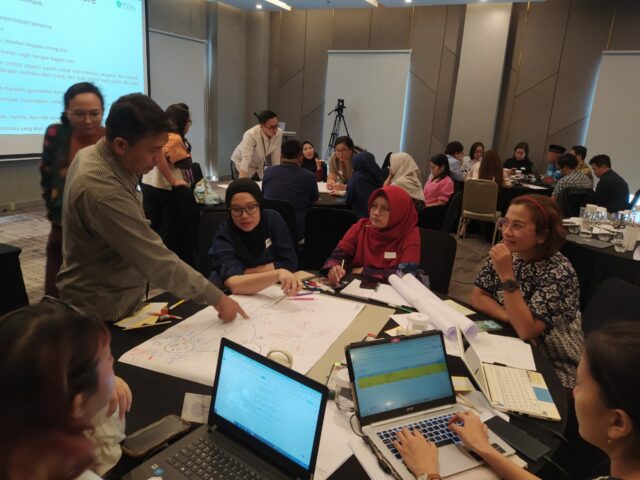
3. Aquaculture Group:
Goal: Promote sustainable aquaculture that supports food security through multi-stakeholder collaboration.
Key Elements:
- Sustainable aquaculture practices
- Food security
- Collaboration among various stakeholders
4. Inland Fisheries Group:
Goal: Achieve prosperous Indonesians through inclusive, balanced, sustainable, and locally wise management of inland aquatic ecosystems.
Key Elements:
- Inclusive practices
- Balance in ecosystem management
- Sustainability
- Utilization of local wisdom
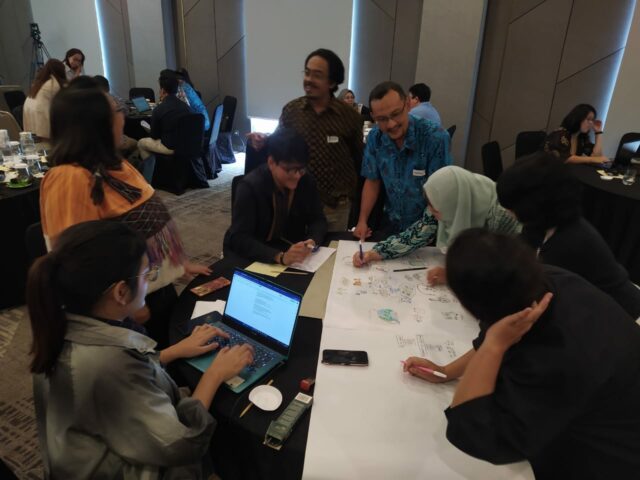
The overarching objective unifying the four aforementioned goals is: to establish a sustainable fisheries food system that fosters inclusivity, ensures social justice, promotes economic prosperity, enhances food and nutrition security, and champions environmental sustainability for the well-being of the community.
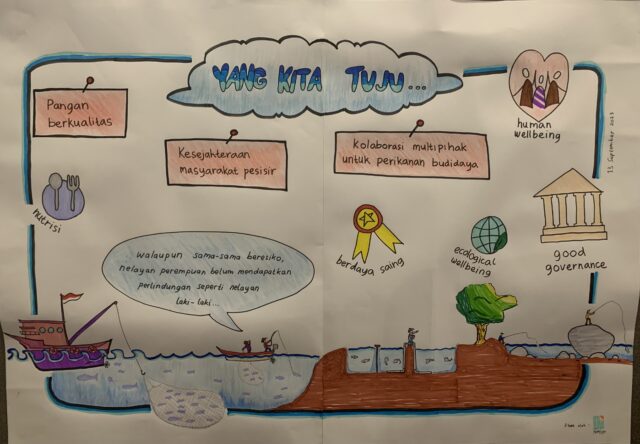
On the following day, 14 September 2023, the results obtained from the Rich Picture discussions in each group were brought together for further analysis and discussion. These discussions utilized the context-specific “Simplified Theory of Change” method to refine the group-based goals and strategies for achieving them.
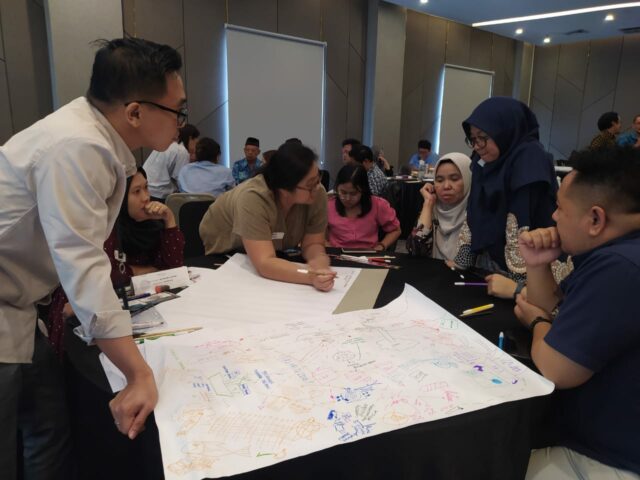
As we draw this workshop to a close and begin the process of synthesizing the outputs, it is crucial to emphasize our commitment to ensuring the sustainability of production and conservation of marine resources in Indonesia.
We recognize that economic growth, environmental protection in ocean management, and ensuring equality and justice for the communities are not mutually exclusive. In fact, they are interdependent components of a holistic approach to addressing the challenges facing our marine ecosystems.
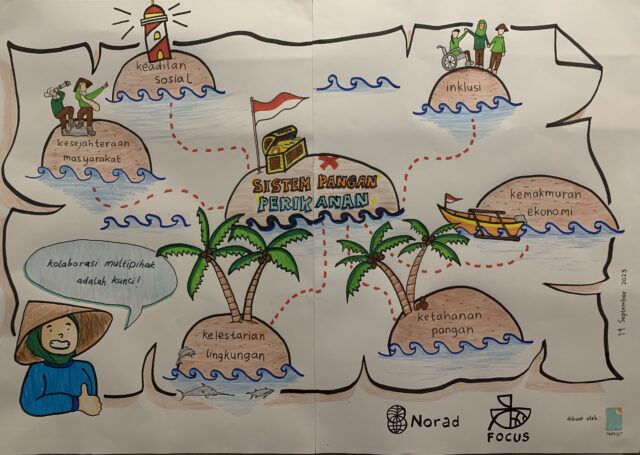
More comprehensive results, along with a detailed report and recommendations stemming from this workshop will be made available soon. Stay tuned, as we embark on a journey to safeguard the rich marine heritage of Indonesia for generations to come!

